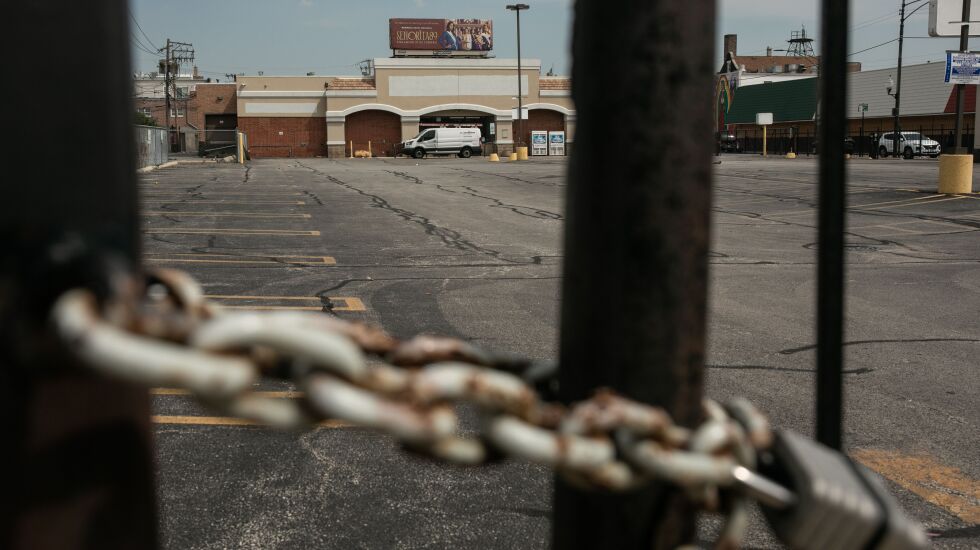By the time Griselda Estrada heard she could keep her shop open, she already had half the merchandise packed and around her, the dust was settling on where neighboring stalls used to be.
Estrada, owner of a leather goods shop, is part of a group of about 40 vendors at the Little Village Discount Mall that have been fighting to remain at the shopping center.
Tuesday was supposed to be the group’s last day in operation at the 26th Street and Albany Avenue location. But Monday afternoon, the city announced that property owner John Novak had granted them another six weeks.
By then, many vendors had already packed up their merchandise — ranging from exotic birds to handmade dresses — and almost all said the reprieve came too late.
“The city did us wrong in this. They waited until the last moment to tell us,” Estrada said as she packed up the store where she’s worked for nearly three decades.
The group represents about half of all mall vendors. Their situation has been in doubt ever since Novak announced in February the other half, managed by Kyunhee Park, had signed a new 10-year lease.
Novak later confirmed the first group, who were with a different management firm, would have to leave — initially by Sunday, and then by Tuesday, after the city intervened. Late Monday, it was pushed back again, for another six weeks.
That last-minute timing had vendors feeling jilted.
“They should’ve helped us a couple weeks ago, not when they knew we were already bringing everything out of here,” said Khodr Kaddoura, owner of a clothing store.

Kaddoura, an immigrant from Lebanon, said he’s been at the mall for about 30 years.
If the mall opens at a new location, as the city has promised, he said he might reopen there. Meanwhile, he said he’ll lose the thousands of dollars he spent building out his space at the mall.
“Where are you going to take it?” he said, pointing to the large wooden stands that had held the merchandise. “What they did is destroy our businesses.”
The city has proposed moving the vendors to a former CVS store at 26th Street and Pulaski Road, about a mile away from the mall. It would keep vendors in the neighborhood, but many say they won’t all fit.
Ald. Byron Sigcho-Lopez, whose 25th Ward includes the mall, said the CVS location, at 20,000 square feet, is “not even viable,” given that it is half the space the vendors have now.
He said he’s helping arrange a larger, if temporary, space at a former Kmart store at 51st Street and Kedzie Avenue, though he hoped to eventually bring back the store to the Lower West Side, calling the vendors part of “a valuable economic engine for the Little Village community.”
The group might eventually move to a new development at 18th and Peoria streets, but meanwhile, the city should expedite permits needed to operate at the Kmart, and vendors by paying for storage until then, he said.
Samir Mayekar, deputy mayor for economic and neighborhood development, acknowledged the CVS was smaller, but said it could help vendors without other options.
“We’re hoping it can accommodate anyone that is displaced,” he said.
CVS owns the site and would sublease it through year’s end, Mayekar said, though a lease has not been signed.
Mayekar couldn’t say how or whether the city would help vendors rebuild their stalls.
Nubia Willman, the city’s chief engagement officer, said she grew up going to the mall and understood its significance. That understanding prompted city officials to work through the weekend to get the extension, she said, but negotiations took time.
“We were waiting for this private entity to give us the green light,” she said. Vendors, meanwhile, “felt they needed to act, and we can’t blame them for that.”
Some vendors won’t reopen at any new location.
Norma Castillo, a dressmaker at the mall since 1995, lives in Little Village and said she can’t imagine going to the Kmart, in Back of the Yards, every day.
“Here we could walk any day, sun, rain or snow,” she said. Castillo worked at the shop with her mom, who taught her how to sew back in Mexico.
She had a couple orders still pending and plans to return to the mall to meet clients, some of whom come from out of state. But after that, she’ll just work from home.
Castillo wasn’t worried about losing clients, but she was worried about what the changes to the mall would mean for the neighborhood, where many already feel pressure from rising property taxes.
Like many, she was angry about the situation and the timing of the city’s offer.
“They’re laughing at us,” she said. “That’s what I think.”
Michael Loria is a staff reporter at the Chicago Sun-Times via Report for America, a not-for-profit journalism program that aims to bolster the paper’s coverage of communities on the South Side and West Side.







